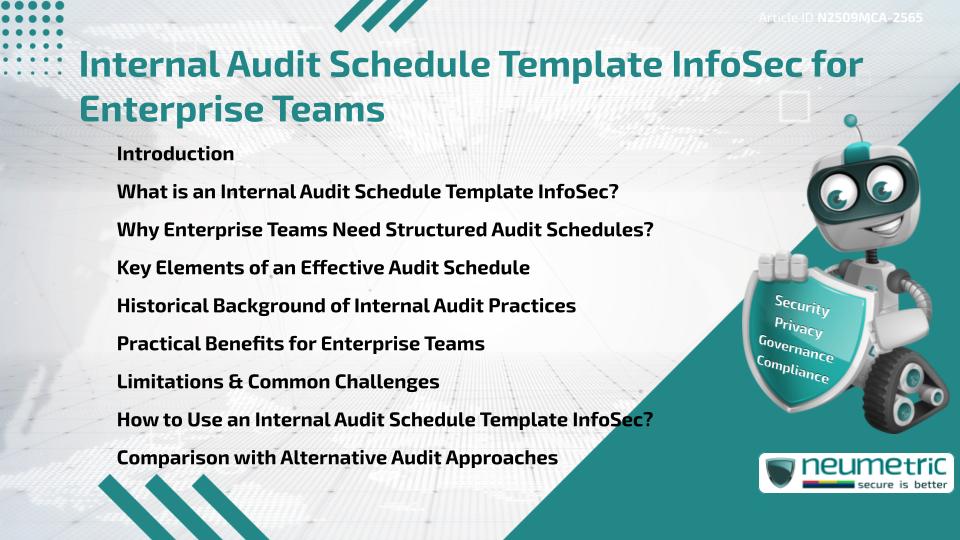Table of Contents
ToggleIntroduction
An Internal Audit schedule template infosec helps enterprise teams plan, monitor & evaluate compliance with Information Security requirements. It provides a structured Framework to ensure that audits are timely, consistent & aligned with organizational goals. By using such templates, teams can reduce Risks, maintain Regulatory Compliance, improve efficiency & strengthen trust with Stakeholders. From highlighting historical roots of internal auditing to practical benefits & limitations, this article explores why Internal Audit schedule templates are essential for enterprise teams managing complex security landscapes.
What is an Internal Audit Schedule Template InfoSec?
An Internal Audit schedule template infosec is a predefined document that outlines the timing, frequency & scope of internal audits. It serves as a roadmap for enterprise teams to conduct systematic reviews of Policies, controls & Compliance Requirements. Much like a calendar for essential check-ups, this template ensures that no critical Audit area is overlooked.
Why Enterprise Teams Need Structured Audit Schedules?
Enterprise teams often manage vast networks, Sensitive Data & strict compliance obligations. Without a structured schedule, audits can become inconsistent or reactive. A template provides uniformity & helps distribute responsibilities, ensuring that teams address both high-Risk areas & routine compliance checks. It also aligns with external regulatory frameworks such as ISO 27001 & NIST guidelines.
Key Elements of an Effective Audit Schedule
An Internal Audit schedule template infosec should include:
- Audit objectives & scope
- Frequency of audits (monthly, quarterly, annual)
- Roles & responsibilities of team members
- Documentation & reporting requirements
- Risk Assessment priorities
These elements ensure that the Audit process is clear, measurable & adaptable.
Historical Background of Internal Audit Practices
Internal auditing is not new. Its roots date back to ancient civilizations that developed checks & balances for Financial accountability. In the twentieth century, auditing evolved into a structured discipline tied closely to corporate Governance & compliance. The rise of digital systems brought a shift toward infosec audits, making the Internal Audit schedule template infosec indispensable for modern enterprises.
Practical Benefits for Enterprise Teams
Using a schedule template brings several advantages:
- Efficiency: Streamlines preparation & reduces redundant efforts
- Consistency: Ensures all critical areas are regularly reviewed.
- Compliance: Supports adherence to HIPAA, GDPR & other regulations.
- Accountability: Assigns responsibility, reducing gaps in oversight.
- Improved Security: Detects Vulnerabilities earlier, lowering Risks.
Limitations & Common Challenges
Despite its value, an Internal Audit schedule template infosec is not flawless. Common challenges include:
- Over-reliance on the template without adapting to unique Risks
- Difficulty keeping the schedule current as systems change
- Resource constraints in large enterprises
- Possible resistance from Employees who view audits as burdensome
Recognizing these limitations helps teams strike a balance between structure & flexibility.
How to Use an Internal Audit Schedule Template InfoSec?
Enterprise teams can use the template by tailoring it to their organizational context. For example, critical systems may require quarterly audits while low-Risk processes can be reviewed annually. Assigning clear roles ensures accountability & integrating reporting formats simplifies communication. Teams can leverage resources from ISACA & SANS Institute for Best Practices.
Comparison with Alternative Audit Approaches
Some enterprises rely on ad hoc audits or external consultants. While these can provide fresh perspectives, they lack the continuity & internal ownership of a template-driven approach. An Internal Audit schedule template infosec, by contrast, ensures that enterprise teams remain proactive, engaged & aligned with long-term security strategies.
Conclusion
An Internal Audit schedule template infosec is more than a planning tool. It represents a commitment to consistency, compliance & accountability in Information Security. By understanding its history, benefits & limitations, enterprise teams can use it as a reliable foundation for improving Audit outcomes.
Takeaways
- An Internal Audit schedule template infosec ensures consistency, compliance & accountability.
- Enterprise teams benefit from efficiency, structure & Risk reduction.
- Templates should be customized to organizational needs for maximum value.
- Awareness of limitations prevents over-reliance & enhances flexibility.
FAQ
What is the purpose of an Internal Audit schedule template infosec?
It helps enterprise teams organise & conduct regular security audits to ensure compliance & Risk Management.
How often should enterprise teams use the template?
Teams should schedule audits according to Risk levels, typically ranging from quarterly to annually.
Can a template replace professional judgment?
No, it provides structure but must be supplemented with professional expertise & organisational insights.
How does it differ from external audits?
Internal Audit schedule templates focus on continuous internal monitoring, while external audits provide independent validation.
Is the template applicable across industries?
Yes, though it should be tailored to the regulatory & operational needs of each sector.
What are the Risks of not using a template?
Lack of consistency, missed Compliance Requirements & higher exposure to security Risks.
Where can teams find reliable resources for building templates?
Organisations like ISO, ISACA & SANS offer guidance & Best Practices for developing effective templates.
Need help for Security, Privacy, Governance & VAPT?
Neumetric provides organisations the necessary help to achieve their Cybersecurity, Compliance, Governance, Privacy, Certifications & Pentesting needs.
Organisations & Businesses, specifically those which provide SaaS & AI Solutions in the Fintech, BFSI & other regulated sectors, usually need a Cybersecurity Partner for meeting & maintaining the ongoing Security & Privacy needs & requirements of their Enterprise Clients & Privacy conscious Customers.
SOC 2, ISO 27001, ISO 42001, NIST, HIPAA, HECVAT, EU GDPR are some of the Frameworks that are served by Fusion – a SaaS, multimodular, multitenant, centralised, automated, Cybersecurity & Compliance Management system.
Neumetric also provides Expert Services for technical security which covers VAPT for Web Applications, APIs, iOS & Android Mobile Apps, Security Testing for AWS & other Cloud Environments & Cloud Infrastructure & other similar scopes.
Reach out to us by Email or filling out the Contact Form…


